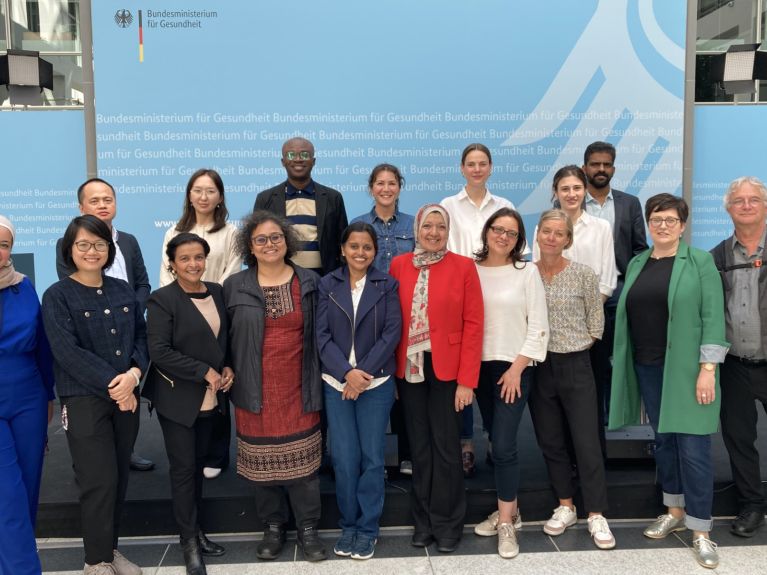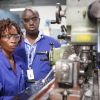“Building trust is essential”
At the invitation of the Federal Foreign Office, international journalists and researchers came together to explore how skilled labour migration can be managed in a way that benefits all sides.

Matching well-trained professionals with companies that urgently need them is a major challenge. Supply and demand have to align, and applicants’ qualifications need to match the required skill profiles. Rasha Sharaf is working on a solution. Sharaf is Secretary General of Egypt’s Education Development Fund. Together with her team, she has developed an interactive database designed to help skilled Egyptian professionals gain a foothold in the German labour market. “We collect job postings from LinkedIn and German employment portals and map them onto a map of cities and regions in Germany,” she explains. “We then combine this with information about the specialisations and qualifications of Egyptian candidates.”
In a meeting room at the German Federal Ministry of Labour and Social Affairs (BMAS) in Berlin, she demonstrates how to navigate the platform – known as the International Labour Market Observatory – using different visualisation and filter options. Sharaf belongs to a group of twelve international migration experts, including several journalists, who are visiting Germany on a programme sponsored by the Federal Government. BMAS staff members are also present at the table. This is her first appointment in a tightly scheduled day that will also include visits to the Ministry of Health and Charité University Hospital.
400,000 new workers needed every year
At the BMAS, the group learns about Germany’s efforts to recruit more international professionals. The figures speak for themselves: Germany needs around 400,000 new workers every year to meet future demand for skilled labour. The level of demand is especially high in nursing, education, the skilled trades, IT, gastronomy and hospitality. A recently reformed skilled labour immigration law allows foreign skilled professionals to enter Germany and start work even before their qualifications have been formally recognised. They can subsequently obtain official recognition with support from the employer through a “recognition partnership”. In addition, an Opportunity Card has been introduced – modelled on Canada’s system – that allows foreign applicants to stay in Germany for up to a year while they search for a job.
In order to speed up the recognition process further, Germany is increasingly pursuing bilateral cooperation through so-called Global Skills Partnerships. The aim here is to incorporate German training modules into the curricula of vocational and university programmes in partner countries. This kind of partnership already exists with Colombia, Ghana, India and Egypt – all of which are represented on this study visit. Diana Amparo Hernandez works at Colombia’s Ministry of Labour, focusing on strategies to help marginalised groups enter the formal labour market. She finds the partnership with Germany valuable. “We have a lot of well-qualified professionals who are open to working abroad. Aligning curricula helps enormously in simplifying the recognition process.”
Building trust
Germany also relies on private recruitment agencies to place foreign workers in its domestic labour market. Nearly 90 percent of urgently needed care workers are recruited through such organisations. Unfortunately, many of these agencies are difficult to assess at first glance in terms of their trustworthiness. At the Federal Ministry of Health, the group learns about a quality seal for fair recruitment in the care sector which was introduced in 2021 for precisely this reason: “Faire Anwerbung Pflege Deutschland”. Based on international standards issued by the World Health Organization (WHO) and the International Labour Organization (ILO), the seal includes clear contractual terms, no costs for applicants, and mandatory integration measures – in particular language training. Samata Biswas, an Assistant Professor at Sanskrit University in Kolkata and a migration researcher, especially praises the project’s public outreach. A recent campaign in her home country reached around 600,000 people – its target audience: young women aged 18 to 24. “Building trust is essential,” she says.
This is also a key issue for Toka Abo Heiba. Heiba works as a social media editor for Cairo 24, one of Egypt’s leading news platforms. Migration is a topic she often encounters in her day-to-day work. There is no shortage of well-educated young people, she says, but she does have questions about the everyday realities foreign professionals face in Germany. Do they suffer discrimination? Can they practise their faith without restrictions? “What I hope to gain from this visit is a better understanding of what day-to-day life is like for Muslim professionals in Germany.”
Positive experience in Germany
That afternoon she gets her chance. The group visits the Virchow Campus of Charité Hospital in Berlin’s Wedding district. Since 2022 the hospital has been recruiting nurses from various countries through a dedicated “Integration Office”. New staff are met at the airport and paid from day one. They receive help opening a bank account and signing a phone contract, and accommodation is provided for the first 18 months. After that, the hospital helps them find their own housing.
The visit begins with a tour of the women’s clinic, where participants are given a chance to speak directly to nursing staff recruited through the Charité programme. In one of the patient rooms they meet a nurse from Syria. While the others move on to the next corridor, Heiba stays behind to speak with the young woman one-on-one in Arabic. What she shares a little later sounds very encouraging: “I asked her very directly how she was doing in Germany. She told me that people here are really taking care of her – and that no one has a problem with her wearing a headscarf.”
Then there is the ongoing debate about the countries of origin losing skilled labour. That’s naturally a political issue, says Diana Hernandez from Colombia. She believes that the real problem is not the brain drain as such, however. “Instead of complaining that people want to work abroad, we should be improving working and training conditions at home.” Meanwhile migration researcher Samata Biswas highlights another important point: migrant workers are a major economic factor for their countries of origin because of the money they send back home. “If managed correctly, skilled labour migration can be a win-win for everyone involved.”


